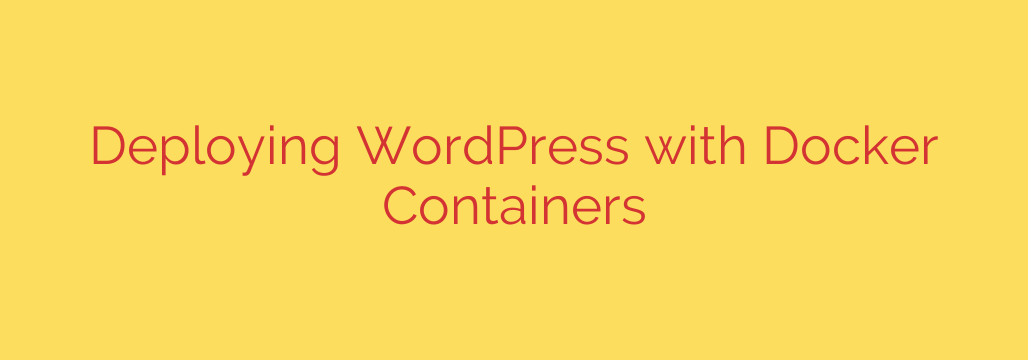
Running WordPress can be made significantly more efficient and consistent by leveraging the power of Docker containers. This modern approach encapsulates your application and its dependencies into isolated units, ensuring it runs the same way regardless of the environment. Deploying WordPress with Docker offers numerous advantages over traditional methods, including simplified setup, enhanced portability, and improved scalability.
At its core, deploying WordPress in containers involves separating the different components that make up a typical WordPress site. This usually means having one container for the WordPress application files and another container for the database, such as MySQL or MariaDB. These containers are linked together, allowing the WordPress instance to communicate with the database.
One of the primary benefits is environment consistency. By defining your WordPress setup within a Dockerfile and potentially using Docker Compose to manage multiple containers, you eliminate the “it works on my machine” problem. This consistency is invaluable for development, staging, and production environments, making deployments and updates much smoother and less prone to errors.
Persistent data is a critical consideration. While the containers themselves are ephemeral (meaning they can be stopped, removed, and rebuilt), your website’s content, themes, plugins, and uploads need to persist. This is achieved using Docker volumes. Volumes mount directories from the host machine or a managed volume system into the container, ensuring that data like the wp-content folder and the database files survive container lifecycle events.
Using Docker Compose streamlines the process of defining and running multi-container Docker applications. A single docker-compose.yml file can describe the entire WordPress stack – the WordPress container, the database container, volume configurations, network settings, and environment variables. This allows you to spin up or tear down the complete environment with a single command, making local development, testing, and even production deployments significantly easier.
Beyond consistency and ease of setup, containerized WordPress offers scalability. Depending on your infrastructure, you can scale the WordPress application containers horizontally to handle increased traffic, often managed by orchestration platforms like Kubernetes or Docker Swarm, although Docker Compose is sufficient for simpler setups.
In summary, adopting Docker for WordPress deployment provides a robust, portable, and efficient way to manage your websites. By packaging WordPress and its dependencies into containers and using tools like Docker Compose for orchestration and volumes for persistence, you gain greater control, consistency, and flexibility compared to traditional hosting setups. This approach is quickly becoming a standard for modern web development and deployment practices.
Source: https://kifarunix.com/how-to-deploy-wordpress-as-a-docker-container/








